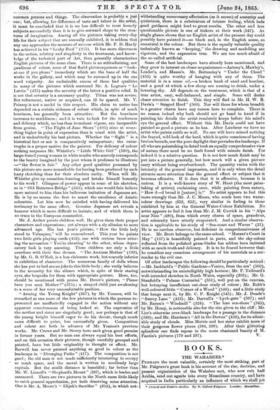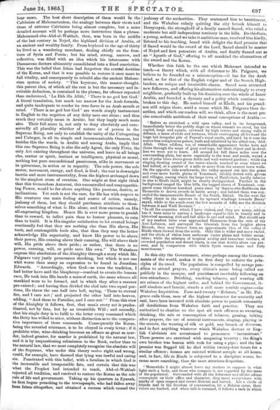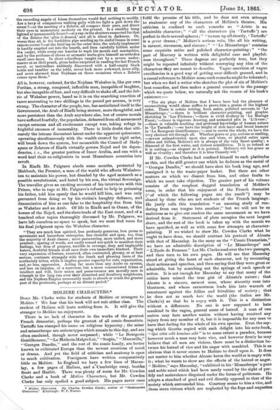BOOKS.
111./. WAHABEES.*
PERHAPS the most valuable, certainly the most striking, part of Mr. Palgrave's great book is his account of the rise, doctrine, and present organization of the Wahabee sect, who now rule half Arabia, send out agents into every Mussulman country, and have acquired in India particularly an influence of which we shall yet • Central and Eastern Arabia. By W. Gifford Palgrave. London: Macmillan. hear more. The best short description of them would • the Calvinists of Mahometanism, the analogy between their views and those of extreme Calvinists being almost complete, but a more detailed account will be perhaps more instructive than a phrase. Mahommed-ebn-Abd-el-Wahhab, then, was born in the middle of the last century in Nejed, the highland division of Arabia, of an ancient and wealthy family. From boyhood to the age of thirty he lived as a wandering merchant, dealing chiefly on the fron- tiers of Syria and Persia ; but his mind, strong, narrow, and reflective, was filled with an idea which his intercourse with Damascene doctors ultimately consolidated into a fixed conviction. This was the belief that Islam had forgotten the central doctrine of the Koran, and that it was possible to restore it once more to full vitality, and consequently to rebuild also the ancient Mahom- etan system of society. " This keystone, this master-thought, this parent idea, of which all the rest is but the necessary and in- evitable deduction, is contained in the phrase, far oftener repeated than understood, ' La Ildh illa Allah,' There is no god but God.' A literal translation, but much too narrow for the Arab formula, and quite inadequate to render its true force in an Arab month or mind. ' There is no god but God' are words simply tantamount in English to the negation of any deity save one alone ; and thus much they certainly mean in Arabic, bilt they imply much more also. Their full sense is, not only to deny absolutely and unre- servedly all plurality whether of nature or of person in the Supreme Being, not only to establish the unity of the Unbegetting and Unbegot, in all its simple and incommunicable Oneness, but besides this the words, in Arabic and among Arabs, imply that this one Supreme Being is also the only Agent, the only Ffrce, the only Act existing throughout the universe, and leave to all beings else, matter or spirit, instinct or intelligence, physical or moral, nothing but pure unconditional passiveness, alike in movement or in quiescence, in action or in capacity. The sole power, the sole motor, movement, energy, and deed, is God ; the rest is downright inertia and mere instrumentality, from the highest archangel down to the simplest atom of creation. One might at first sight think that this tremendous Autocrat, this uncontrolled and unsympathiz- ing Power, would be far above anything like passions, desires, or inclinations. Yet such is not the case, for He has with respect to His creatures one main feeling and source of action, namely, jealousy of them, lest they should perchance attribute to them- selves something of what is His alone, and thus encroach on His all-engrossing kingdom. Hence He is ever more prone to punish than to reward, to inflict pain than to bestow pleasure, to ruin than to build. It is His singular satisfaction to let created beings continually feel that they are nothing else than His slaves, His tools, and contemptible tools also, that thus they may the better acknowledge His superiority, and know His power to be above their power, His cunning above their cunning, His will above their will, His pride above their pride ; or rather, that there is no power, cunning, will, or pride save His own." The Wahabees express this absolutism of the Almighty through a story which Mr. Palgrave very justly pronounces shocking, but which is not one whit worse than many an expression to be found in Jonathan Edwards. " Accordingly, when God—so runs the tradition, I had better have said the blasphemy—resolved to create the human race, He took into His hands a mass of earth, the same whence all mankind were to be formed, and in which they after a manner pm-existed ; and having then divided the clod into two equal por- tions, He threw the one half into hell, saying, These to eternal fire, and I care not ;' and projected the other half into heaven, adding, " And these to Paradise, and I care not." From this view of the Almighty it follows, first, that man's every act is predes- tinated, not by fate, but by an irresistible Will ; and secondly, that his single duty is to fulfil to the letter every command which the Deity has willed to utter, without distinction as to the compara- tive importance of those commands. Consequently the Koran, being the revealed utterance, is to be obeyed in every letter ; if it prohibits wine, wine-drinking becomes an offence as great as mur- der, indeed greater, for murder is prohibited by the natural law, and it is by unquestioning submission to the Book, rather than to the natural law, that we most completely recognize the absolute will of the Supreme, who under this theory makes right and wrong, could, for example, have decreed that lying was lawful and eating sin. Penetrated with this belief, with a fatalism in which God is the inexorable and irresponsible fate, and certain that this was what the Prophet had intended to teach, Abd-el-Wahhab rejected all tradition, and resolved to restore the Koran as the sole rule of life and government. Taking up his quarters in Eyanah, he first began preaching to the townspeople, who had fallen away from Islam altogether, and obtained a success which roused the
jealousy of the authorities.. They sentenced him to banishment, and the Wahabee calmly quitting the city betook himself to Dereyeeyah, the stronghold of a family named Saood, who ruled a moderate but still independent territory in the hills. Its chieftain, a young, ardent, and we take it ambitious man, received him kindly, listened to his teaching, heard with delight the final promise that if Saood would be the sword of the Lord, Saood should be master of Nejed and first potentate of Arabia, and finally flamed out as an "Apostle of God," offering to all mankind the alternatives of the sword and the Koran.
Whether this faith be the one which Mahomet intended to teach—a theory which, with all deference to Mr. Palgrave, we believe to be founded on a misconception—it has for the Arab mind, as for that of the English vulgar and of the Scotch High- landers, an unique and irresistible charm. Saood soon attracted new followers, and offering his alternatives unhesitatingly to every neighbour, gradually built up his dominion over the whole of Inner Arabia, and founded a dynasty and a polity which continue un- broken to this day. He seated himself at Riadh, and his grand- son still reigns there, amid a scene which Mr. Palgrave thus de- scribes, and which our readers will, we think, allow is the most pre- cise conceivable antithesis of their usual conceptions of Arabia :—
"Before us stretched a wild open valley, and in its foreground,
immediately below the pebbly slope on whose summit we stood, lay the capital, large and square, crowned by high towers and strong walls Of defence, a mass of roofs and terraces, where overtopping all frowned the huge but irregular pile of Feysul's royal castle, and hard by it rose the scarce less conspicuous palace, built and inhabited by his eldest son, 'AM- Allah. Other edifices, too, of remarkable appearance broke here and there through the maw of grey roof-tops, but their object and in-dwel- lers we were yet to learn. All around for full three miles over the surrounding plain, but more especially to the west and south, waved .a sea of palm trees above green fields and well-watered gardens ; while the singing droning sound of the water-wheels reached us even where we had halted, at a quarter of a mile or more from the nearest town walls.
On the opposite aide southwards, the valley opened out into the great
and even more fertile plains of Yemftmah, thickly dotted with groves and villages, among which the large town of Manfoohab, hardly inferior in size to Riadh itself, might be clearly distinguished. Farther in the background ranged the blue hills, the ragged sierra of Yemimah, com- pared some thirteen hundred years since by 'Amroo-ebn-Kelthoom the Shomerite to drawn swords in battle array ; and behind them was con- cealed the immeasurable Desert of the South, Dahnit. On the west the valley closes in the narrows in Its upward windings towards Derry' eeyab, while to the south-west the low mounds of Affitj are the division between it and Wadi Dowitair." "In all the countries which I have visited, and they are many, seldom has it been mine to survey a landscape equal to this in beauty and In historical meaning, rich and full alike to eye and mind.. But should anj of my readers have over appreaehed Damascus from the side of the Anti-Lebanon, and surveyed the Ghootah from the heights above Mazzeh, they may thence form an approximate idea of the valley of Riadh when viewed from the north. Only this is wider and more varied, and the circle of vision here embraces vaster plains and bolder moun- tains ; while the mixture of tropical aridity and luxuriant verdure, of crowded population and desert tracts, is one that Arabia alone can pre- sent, and in comparison with which Syria seems tame and Italy monotonous."
In this city the Government, alone perhaps among the Govern- ments of the world, makes it its first duty to enforce the prin- ciples of its creed. The population is compelled by savage pen- alties to attend prayers, every citizen's name being called out publicly in the mosque, and punishment inevitably following oh non-attendance. Drinking, smoking tobacco, and wearing silk are crimes of the highest order, and behind the Government, it-
self absolute and fanatic, stands a still more terrible engine—the Wahabee Inquisition. Four-and-twenty " Zelators," as Mr. Pal- grave calls them, men of the highest character for austerity and zeal, have.been invested with absolute power to punish summarily all derelictions from Wahabee faith and practice. They are authorized to chastise on the spot all such offences as swearing, drinking, the sale or consumption of tobacco, gaming, talking after prayers, the use of musical instruments, singing, playing in the streets, the wearing of silk or gold, any breach of decorum, and in fact anything whatever which Wahabee doctors or Eng- lish Calvinists are accustomed to pronounce " inconsistent." These powers are exercised with unsparing severity ; the King's own brother was beaten with rods for using a pipe ; and the last premier was flogged till he died within twenty-four hours for a similar offence ; houses are entered without scruple at all hours, and, in fact, life in Riadh is subjected to a discipline worse, be- cause more searching, than the most atrocious despotism.
"Meanwhile I might almost leave my readers to suppose in what
light such a body, and those who compose it, are regarded by the mass of the population. Surrounded with all the deference and all the odium consequent on their office and character, they meet everywhere with marks of open respect' the recording angels of Islam themselves would find nothing to modify. Are a bevy of companions walking gaily with too light a gait down the street ?—at the meeting of a Zelator, all compass their pace, and direct their eyes in momentary modesty on the ground. Is a stealthy lamp lighted at unreasonable hours?—at a rap on the shutters suspected for that of the Zelator the 'glim is doused,' and all is silent in darkness. Or, worse than all, is the fordidden pipe sending up its sinful fumes in some remote corner?—at the fatal tap on the outer door, the unholy implement is hastily emptied out into the hearth, and then carefully hidden under the carpet, while every one hurries to wash his mouth and mustachios, and by the perfume of cloves or aromatic herbs give himself an orthodox smell once more. In short schoolboys caught out by a severe under- master at an ilicit prank, pious ladies surprised in reading the last French novel, or teetotallers suddenly discovered with a half-empty black bottle and tumbler on the table, never look more awkward, more silly, and more alarmed than Nejdeans on these occasions when a Zelator comes upon them."
All is, however, endured, for the Nejdean Wahabee is, like par own Puritan, a strong, composed, inflexible man, incapable of laughter, but also incapable of fear, and very difficult to shake off, and the fab- ric of Wahabee power, based as it is on the searching exaction of taxes amounting to two shillings in the pound per annum, is very strong. The character of the people, too, has assimilated itself to the Government, the Arab of Riadh being sterner, more thoughtful, and more persistent than the Arab anywhere else, but of course morals have suffered fearfully, the population, debarred from all amusement except sermons and all excitement except war, taking refuge in frightful excesses of immorality. There is little doubt that ulti- mately the intense discontent latent under the apparent quiescence, operating simultaneously with the wealth created by rigid order, will break down the system, but meanwhile the Council of Medy- ayees or Zelators of Riadh virtually govern Nejed and its depen- dencies, i. e., the greater portion of Inner Arabia, and can with a word hurl their co-religionists in most Mussulman countries into revolt.
In Riadh Mr. Palgrave abode some months, protected by Mahboob, the Premier, a man of the world who affects Wahabee- ism to maintain his power, but dreaded by the aged monarch as a possible revolutionist, and hated by his son, the virtual Sovereign. The traveller gives an exciting account of his interviews with this Prince, who in rage at Mr. Palgrave's refusal to help in poisoning his father, told him openly that he would kill him, and was only prevented from doing so by his victim's haughty defiance, and denunciation of him as one false to the hospitality due from him as Wahabee and an Arab. Of life in Riadh and in Oman, of the horses of the Nejed, and the slave trade of the East coast, and of a hundred other topics thoroughly discussed by Mr. Palgrave, we have left ourselves no space to speak, but we must find room for his final judgment upon the Wahabee character.
" They are much less spirited, less profusely generous, less prone to movement and hazardous enterprise, less cheerful and open, too, than the majority of Arab classes ; more persevering, more united, and more prudent ; sparing of words, not easily roused nor quick to manifest their feelings, but firm of purpose, terrible in revenge, deep and implacable haters, doubtful friends to all save their own immediate kindred. Their very expression of feature, reserved, often contracted, gloomy, or at best serious, contrasts strangely with the frank and pleaaing faces of the northernly tribes, while it implies greater capacity for rule, organization, and, no less, oppression. Acting far more than any Arabs on system, and less on impulse, of a narrower, but a more concentrated frame of intellect and will, their union and perseverance are morally sure to triumph in the long run over their disunited and desultory neighbours, and the Nejdean Empire necessarily tends to absorb or crush the greater part of the peninsula, perhaps at no distant period."
































 Previous page
Previous page